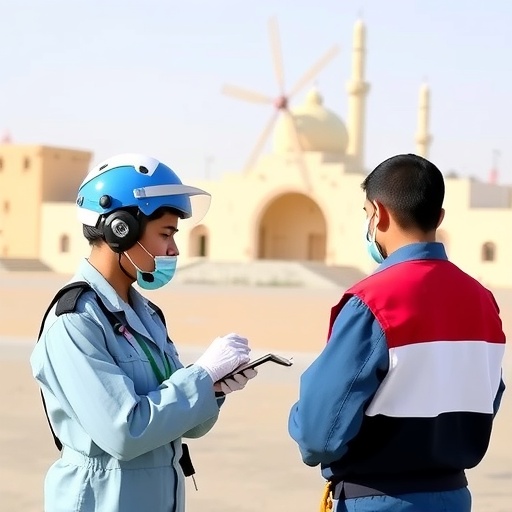In a groundbreaking study that has implications for medical education worldwide, researchers from Jordan have shed light on the readiness for self-directed learning among paramedic students. The findings of this multi-institutional study, published in BMC Medical Education, reveal significant insights that could transform how paramedic training is approached. With the increasing demand for skilled healthcare professionals, this research underscores the necessity for educational systems to evolve and meet the needs of both students and the healthcare industry.
Self-directed learning, a process where individuals take the initiative in diagnosing their learning needs, formulating goals, identifying resources, and evaluating outcomes, is particularly vital in demanding fields such as medicine and emergency response. The study assessed a diverse group of paramedic students across multiple institutions, examining their levels of readiness for such educational approaches. The critical analysis of this readiness illuminates the potential strengths and weaknesses within the current educational frameworks utilized in paramedic training.
One key finding was that a significant portion of the participants exhibited a favorable attitude toward self-directed learning. This disposition is particularly encouraging, as it suggests that students are not only willing to take charge of their educational journeys but are also aware of the importance of life-long learning in their future careers as paramedics. The ability to self-direct is crucial in emergency situations where quick decision-making and adaptability are paramount.
Moreover, the study revealed some alarming gaps in the students’ preparedness for self-directed learning. While many students recognized its benefits, there were notable deficiencies in their skills to identify appropriate learning resources and strategies. This disconnect raises important questions about the effectiveness of current educational practices that may not be adequately equipping students with the necessary tools needed for independent learning and critical thinking.
In response to these findings, the researchers advocate for a curricular review and redesign that emphasizes self-directed learning strategies within paramedic training programs. Educational institutions must consider integrating structured learning experiences that enhance students’ autonomy and capability to identify their learning needs. Active learning methodologies, such as problem-based learning or simulation exercises, could play critical roles in fostering a culture of self-directed learning among paramedics.
The online nature of many educational resources presents both challenges and opportunities for self-directed learning. Students today have access to incredible volumes of information through the internet; however, sifting through this plethora of content to identify credible sources can be daunting. The researchers emphasize the importance of teaching students how to discern valuable information from misleading or incorrect data, especially in a field where misinformation could have serious real-world consequences.
Encouragingly, the study also points to potential interventions that can bolster students’ readiness for self-directed learning. Mentorship programs and peer collaboration can be utilized to create supportive networks that empower students to take charge of their education, share learning strategies, and offer feedback to one another. Establishing a learning community where students feel comfortable discussing their challenges and triumphs could help build resilience and a greater capacity for self-direction.
Additionally, the role of instructors in fostering self-directed learning should not be underestimated. Educators can create environments that encourage inquiry and exploration, where students feel safe to ask questions and seek assistance. Workshops on self-directed learning techniques, coupled with regular assessments that encourage reflection on personal learning goals, can enhance students’ competencies and instill a sense of ownership over their education.
Transitioning into a self-directed learning paradigm can present hurdles, particularly in traditional educational settings that rely heavily on instructor-led approaches. However, by gradually implementing elements that support self-direction, institutions can foster an educational atmosphere that prioritizes student agency and adaptability. This transition is particularly critical in the context of paramedic training, where the ability to adapt and learn autonomously can directly impact patient outcomes.
As the study advocates for changes within health education, it also highlights the broader implications for public health. By preparing paramedic students to be proactive learners, we empower the next generation of healthcare professionals to respond more effectively to the ever-evolving landscape of medical emergencies. A resilient and adaptable workforce can contribute to enhanced health outcomes and improved community safety.
This multi-institutional study marks a significant step toward advancing paramedic education, but it is only the beginning. There is a pressing need for ongoing research to monitor the effectiveness of changes made in curricula following these findings. As educational methodologies evolve, continuous feedback and adaptation will ensure that paramedic students remain well-prepared for their vital roles in society.
In conclusion, the readiness for self-directed learning among paramedic students is a critical area of exploration that warrants continued attention. The insights provided by this study not only contribute to the academic discourse surrounding medical education but also hold the potential to inform policies and practices that enhance the quality of healthcare delivery. As higher education institutions reflect on these findings, the push toward fostering self-directed learners could yield significant benefits for healthcare professionals and their communities in the long run.
Subject of Research: Readiness for self-directed learning among paramedic students.
Article Title: Readiness for self-directed learning among paramedic students in Jordan: A multi-institutional study.
Article References:
Alwidyan, M.T., Al-Nusour, E.A., Alrawashdeh, A. et al. Readiness for self-directed learning among paramedic students in Jordan: A multi-institutional study.
BMC Med Educ 25, 1575 (2025). https://doi.org/10.1186/s12909-025-07717-3
Image Credits: AI Generated
DOI: https://doi.org/10.1186/s12909-025-07717-3
Keywords: self-directed learning, paramedic education, health education, medical training, emergency response, student preparedness, lifelong learning, educational strategies, Jordan.




